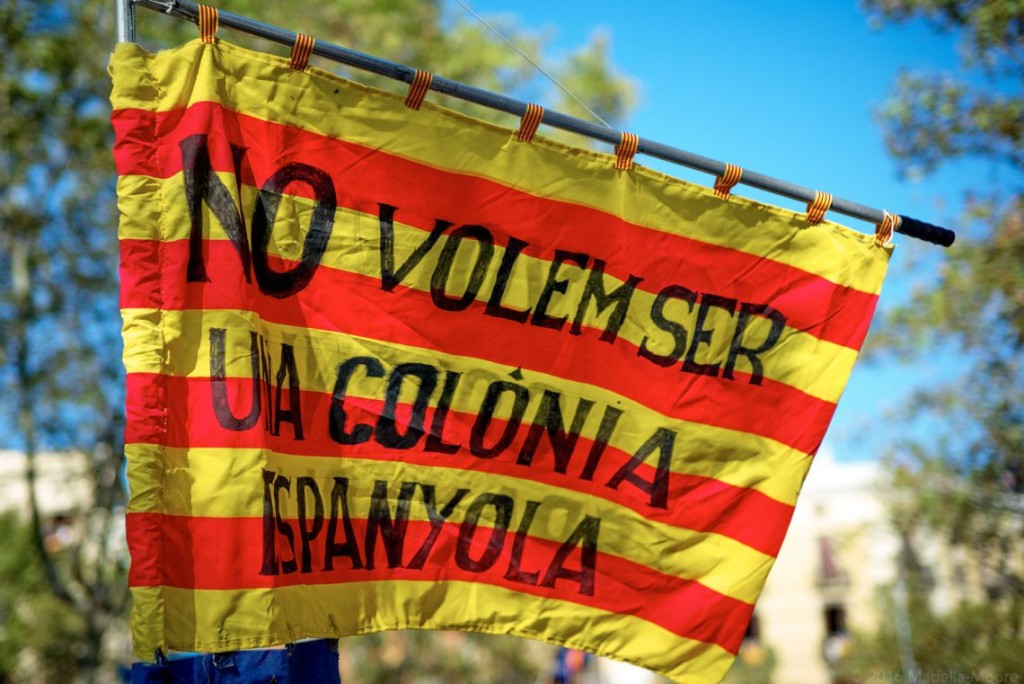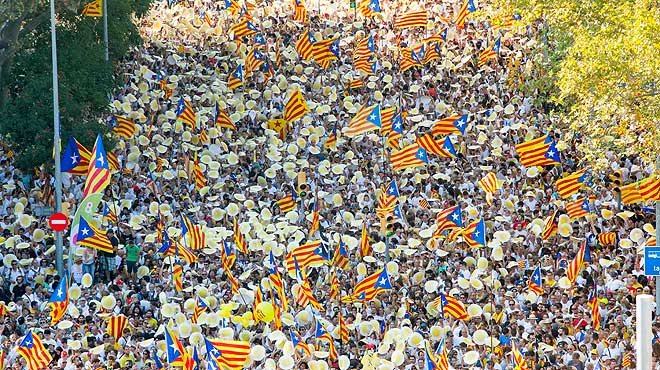PHOTO: Diada March in Barcelona on Catalan Independence Day, September 11, 2016
With many people in Catalonia seeking independence from Spain, the nation celebrated the Catalan National Day last Sunday.
See Catalonia Opinion: The Dawn of Catalan Independence
Catalonia Q&A: The Quest for Independence from Spain
Ellis Palmer Babe, EA WorldView’s Digital Media Editor, speaks with Catalan journalist Xènia Bussè about the celebration of the Diada and what lies beyond it.
Tell us a little bit about yourself, Xènia: what’s your life as a journalist been like so far?
I was born in Valls (near Tarragona) in 1968. I graduated from the Autonomous University of Barcelona with a degree in journalism in 1991. I have worked for the weekly magazine El Temps, the newspapers Avui, Diari de Tarragona, Serra d’Or and the digital newspaper El Món. I collaborated with Página 12 in Buenos Aires (Argentina) when I lived between 1995 and 1996. I also worked for a few years as the head of press for the publisher Grup 62. Now I write weekly for El Món and Serra d’Or. Also, I’m a yet-to-be-published novelist, living with my three dogs and my husband in Badalona (a city in the outskirts of Barcelona).
How important is civil society in Catalonia’s independence movement?
I’m not part of any organization, although both the Catalan National Assembly and Omnium have my full support in their civil society initiatives aimed at pressuring the Catalan Government and Parliament for independence, as they did when they encouraged the government to go to the polls on September 27, 2015. I’m a member of the Platform for the Catalan Language because I think that the Catalan language needs all of our help to survive and thrive: it’s an essential part of our history that has been bequeathed to us through the stubborn survival of the Catalan people.
The civil society organizations have become essential in our path towards independence. They effectively channeled the demand that emerged powerfully from the streets to the institutions. They acted as the engine driving the motor of the independentist cause, ensuring that the wishes of the people were put in place.
I should also add that the role of AMI (the Association of Municipalities for Independence) has been key. The first consultations on independence came about as a result of support from those closest to ordinary citizens: through village, town and city councils. Of the 948 municipalities in Catalonia, 787 are part of the AMI: this is very important, as they have played in crucial role in driving forward institutional support for independentist civil society groups. The AMI has joined added other institutions, such as the provincial and district councils, that deal with municipal issues.
“The Catalan People Cannot State Their Desire for Independence More Clearly”
Since 2010, when a massive demonstration took place in Barcelona to protest against the Constitutional Court’s decision to overturn a rewriting of the Catalan statute of autonomy that had already been significantly modified by the Spanish Congress and Senate, I have attended the 11th September demonstration every year with my family and friends.
This year, I was all set to take the metro and go to Tram 37 in Barcelona, but my husband was ill and so I couldn’t go. I was glued to the television the whole day, watching it all unfold; I was there in spirit, even though I was not able to be out on the streets in person.
Over the last five years, there have been five massive demonstrations of the Catalan people demanding their freedom and their own state; such mobilizations are unprecedented in the history of Western democracies. The Catalan people cannot state their desire for independence more clearly.
We could compare the Diada with the Million Man March of 1995 [in the US] and we’ve gathered one million people to support the cause of Catalan independence six times in a row in a country of 7.5 million!
The message to Catalan Parliament and Puigdemont government was clear: guys, we want you to work together to deliver us independence as soon as possible.
When I bought the ANC’s t-shirt for the Diada, I decided not to put my name on the back, but rather I wrote the name of my grandfather, “Mingo” to honor him and to remember what he had told me many times: “The happiest day of my life, apart from when your father was born, was when The president Francesc Macià proclaimed the Catalan Republic in 1931”.

“We Do Not Want to Be A Spanish Colony”
What made this year’s Diada different from previous years?
The Diada was special this year: we have confirmed that, despite the pressures, threats of jail for our democratically elected leaders, the judgments of the Spanish Constitutional Court, the discouragement that occurs in the parliament of our country, Catalans of all backgrounds and colors know that we want to have a state to govern ourselves, to be a republic, and to be fairer and more egalitarian than the status quo. We have only one choice for the future: to be free of a state that desires to restrict our rights.
The feeling is that we are reaching the point of hitting the political accelerator. The tempos of the people and political tempos are not dancing to the same tune. The Catalan people wanted to demonstrate clearly that we, together with our political representatives, are ready for anything that might happen. We will resist what we have to. Our freedom is at stake.
What do you think will happen with the Catalan situation in the coming months?
It appears likely that, on September 28, Carles Puigdemont and his government will overcome a vote of confidence in the Catalan Parliament. The Puigdemont Government should then have a majority of independentist deputies which would demonstrate that the government has the necessary backing for to determinedly put in place the laws of disconnection and through the basic laws, legislate with a full Catalan and republican legality.
The people must ratify it, one way or another, but the Government must follow the plan to lead us to independence because that is what they promised us in September last year when we voted for them and gave them a majority.
There is the other side, Spain, that only counts in this process because it will be the “bad guy” of the movie, as it refuses to let us do things our own way. But this is a relative problem: if/when the new republic is created, Spain no longer affect us at all. In fact, right now, what Spain can do is very limited.
From the moment Carme Forcadell presides over the sessions of Parliament, from now until there are constituent elections in the new republic, Spain is already a foreign country. Whether Spain has formed a government or not will not affect us in the slightest.

